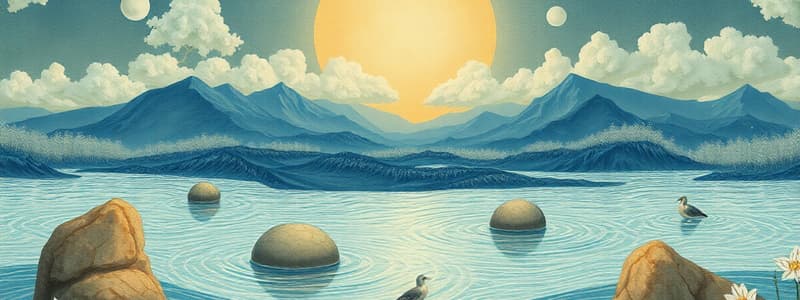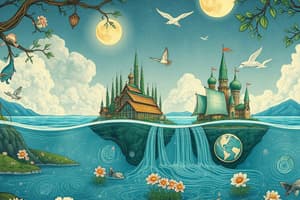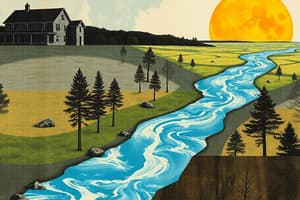Podcast
Questions and Answers
What is the process through which gaseous water vapor becomes liquid water?
What is the process through which gaseous water vapor becomes liquid water?
- Evaporation
- Transpiration
- Condensation (correct)
- Sublimation
Which statement correctly describes the relationship between condensation and precipitation?
Which statement correctly describes the relationship between condensation and precipitation?
- Condensation occurs only during precipitation events.
- Precipitation occurs without any condensation process.
- Condensation and precipitation are unrelated processes.
- Condensation causes clouds to form, which eventually leads to precipitation. (correct)
What role does transpiration play in the water cycle?
What role does transpiration play in the water cycle?
- It facilitates evaporation from plant leaves. (correct)
- It collects surface water into groundwater.
- It transforms solid ice into gas.
- It creates clouds by cooling water vapor.
What is sublimation in the context of the water cycle?
What is sublimation in the context of the water cycle?
Which one of the following processes contributes to the replenishment of aquifers?
Which one of the following processes contributes to the replenishment of aquifers?
What percentage of all the water on Earth is freshwater?
What percentage of all the water on Earth is freshwater?
What happens when air becomes saturated with water vapor?
What happens when air becomes saturated with water vapor?
What is the primary process by which liquid water enters the atmosphere in the water cycle?
What is the primary process by which liquid water enters the atmosphere in the water cycle?
Which phase of the water cycle involves water vapor cooling and transforming into liquid water?
Which phase of the water cycle involves water vapor cooling and transforming into liquid water?
How does runoff contribute to the water cycle?
How does runoff contribute to the water cycle?
Which component of the hydrosphere does NOT include solid water?
Which component of the hydrosphere does NOT include solid water?
Which of the following processes directly leads to the formation of precipitation?
Which of the following processes directly leads to the formation of precipitation?
What is the key distinguishing feature of sublimation in the water cycle?
What is the key distinguishing feature of sublimation in the water cycle?
What happens during infiltration in the water cycle?
What happens during infiltration in the water cycle?
Flashcards
Evaporation
Evaporation
The process of liquid water changing into water vapor, commonly seen as steam rising from boiling water or a wet sidewalk on a hot day.
Condensation
Condensation
The process of gaseous water vapor turning back into liquid water, often observed as water droplets forming on a cold glass or bottle.
Precipitation
Precipitation
Water returning to Earth's surface from the atmosphere in various forms, including rain, snow, or hail.
Water Cycle
Water Cycle
Signup and view all the flashcards
Sublimation
Sublimation
Signup and view all the flashcards
Transpiration
Transpiration
Signup and view all the flashcards
Runoff
Runoff
Signup and view all the flashcards
What is the water cycle?
What is the water cycle?
Signup and view all the flashcards
What is the hydrosphere?
What is the hydrosphere?
Signup and view all the flashcards
What is evaporation?
What is evaporation?
Signup and view all the flashcards
What is condensation?
What is condensation?
Signup and view all the flashcards
What is precipitation?
What is precipitation?
Signup and view all the flashcards
What is sublimation?
What is sublimation?
Signup and view all the flashcards
What is transpiration?
What is transpiration?
Signup and view all the flashcards
What is runoff?
What is runoff?
Signup and view all the flashcards
Study Notes
The Water Cycle: A Summary
- The water cycle, also known as the hydrologic cycle, describes the continuous movement of water on, above, and below Earth's surface.
- Water constantly changes states (solid ice, liquid water, and gaseous water vapor) during the cycle.
- The hydrosphere encompasses all water near Earth's surface, in all states.
- Earth's water supply is finite and recycled through the water cycle.
Main Parts of the Water Cycle
- Evaporation: Liquid water heated by the sun transforms into water vapor in the atmosphere. This is a common way for water to re-enter the atmosphere from surfaces like lakes, oceans, and rivers.
- Condensation: Water vapor cools and changes back into liquid water, forming clouds. Condensation can be triggered by saturation (air is overly full of water vapor) or by cooling to the dew point (water vapor cools to its condensing temperature).
- Precipitation: Water returns to Earth's surface as rain, snow, sleet, or hail. Precipitation occurs when clouds become overly saturated with water droplets, causing them to fall.
Other Important Processes
- Sublimation: Solid water (ice or snow) directly changes to water vapor without becoming liquid first.
- Transpiration: Water evaporates from plants' leaves through small openings called stomata.
- Runoff: Precipitation flows over the land surface.
- Infiltration: Water soaks into the ground.
Importance of the Water Cycle
- The water cycle is essential for all life on Earth.
- It recycles water, a vital resource—our supply is finite.
- Water is essential for life, but only a small portion of water on Earth is freshwater.
- The water cycle affects climate patterns and weather systems. It shapes ecosystems and geographic features.
Studying That Suits You
Use AI to generate personalized quizzes and flashcards to suit your learning preferences.




